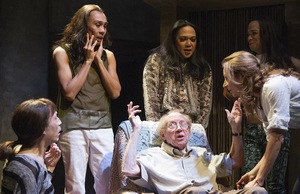SITE GUIDE
SEARCH
REVIEWS
REVIEW ARCHIVES
ADVERTISING AT CURTAINUP
FEATURES
NEWS
Etcetera and
Short Term Listings
LISTINGS
Broadway
Off-Broadway
NYC Restaurants
BOOKS and CDs
OTHER PLACES
Berkshires
London
California
New Jersey
DC
Connecticut
Philadelphia
Elsewhere
QUOTES
TKTS
PLAYWRIGHTS' ALBUMS
LETTERS TO EDITOR
FILM
LINKS
MISCELLANEOUS
Free Updates
Masthead
Writing for Us
A CurtainUp  London Review
London Review
 London Review
London ReviewPaper Dolls
|
A world tour like The Spice Girls - only pretty.
— Zhan
|

Harry Dickman as Chaim surrounded by Francis Jue as Sally, Jon Norman Schneider as Jiorgio, Angelo Paradaso as Zhan, Caroline Wildi as Adina and Ron Domingo as Chiqui (Photo: Tristram Kenton) |
. The dictate of orthodox Jewry is that women cannot provide intimate care for these men. The resulting cultural potpourri is that visas can be issued to Filipino men to work in Israel in the homes of the elderly. Some of these men and all who figure in Philip Himberg's play are gay and will dress as women and on their day off, look to launch careers in show business as drag acts. The name Paper Dolls comes from the exotic dresses that they make out of rolled newspapers and magazines or in weaving folded magazines which make lovely costumes for their show business act.
The story starts at the airport in Tel Aviv when Cheska (Benjamin Wong) goes through Immigration. Yossi (Tom Berish) is an Israeli documentary film maker will make a film about the Filipino men and introduce them to a show business promoter. Sally (Francis Jue) born Salvatore and brought up as a Catholic looks after Chaim (Harry Dickman), whom she calls Papa. Chaim has throat cancer and finds it difficult to talk. Sally has learnt to recite and sing the Jewish prayers for Chaim. Sally and another "doll" will be detained and threatened with deportation. Adina (Caroline Wildi) is Chaim's daughter, grieving for her son Ezra killed by the abominably named "friendly fire". We shall also meet Yossi family when the dolls are welcomed by his mother Yael (Jane Bertish). The group will audition for a drag act and be instructed to appear as Japanese geishas which they are unhappy with. The documentary film allows for much biographical detail about the Paper Dolls to be uncovered in a natural way.
The most pleasing aspect of this play is its humanity. The elderly are well cared for, with affection and humour. One man, given the choice, would rather stay with his carer in Israel than move to live with his daughter in New York. The carers are also seen with their foibles and personal difficulties. One tells us he must pay back $3500 to the agents who arranged the employment and the visa and of course, if they lose their job, or the person they care for dies, they are in danger of being deported with debt. The up side about life in Tel Aviv is that the Paper Dolls are allowed to be themselves one day a week in a somewhat cheesy drag act.
Interspersed in the play are atmospheric and traditional folk songs from Hasidic young men in those black hats with ringlets as well as popular music sung by the Paper Dolls. The set is a concrete stairs and balcony which allows for different playing levels. When Yossi is filming, the images are projected at the rear. In the opening scene, Hebrew script is projected across the concrete. A sad, plaintive Jewish folk song is followed by the Pythonesque culture shock of a drag act singing the Bananarama hit, "Venus". The feel good closing number sees "Take A Walk On The Wild Side" paired with all of the rest of the cast as young Hasidim.
The originality and good will of Paper Dolls counters any misgivings about some aspects of the taste of the piece and I found myself grinning with these likeable characters. On opening night at the end of the play, director Indhu Rubasingham introduced on stage, three of the real Paper Dolls.
|
Subscribe to our FREE email updates with a note from editor Elyse Sommer about additions to the website -- with main page hot links to the latest features posted at our numerous locations. To subscribe,
E-mail: esommer@curtainup.comesommer@curtainup.com
put SUBSCRIBE CURTAINUP EMAIL UPDATE in the subject line and your full name and email address in the body of the message -- if you can spare a minute, tell us how you came to CurtainUp and from what part of the country. |
| Papers Dolls
Written by Philip Himberg Adapted from the documentary film by Tomer Heymann Directed by Indhu Rubasingham Starring: Tom Berish, Ron Domingo, Francis Jue, Angelo Paragoso, Jon Norman Schneider, Benjamin Wong, Jane Bertish, Harry Dickman, Caroline Wildi With: Noa Bodner, Ilan Goodman, Shimi Goodman, Tom Oakley Designed by Richard Kent Music: Nigel Lilley and Max Ringham Lighting: Oliver Fenwick Sound: Ben and Max Ringham Choreography: Alistair David Running time: Two hours 30 minutes including an interval Box Office: 020 7328 1000 Booking to 28th April 2013 Reviewed by Lizzie Loveridge based on 6th March 2013 at the Tricycle Theatre, 269 Kilburn High Road, London NW6 7JR (Tube: Kilburn) |
|
REVIEW FEEDBACK Highlight one of the responses below and click "copy" or"CTRL+C"
Paste the highlighted text into the subject line (CTRL+ V): Feel free to add detailed comments in the body of the email . . . also the names and emails of any friends to whom you'd like us to forward a copy of this review. |




